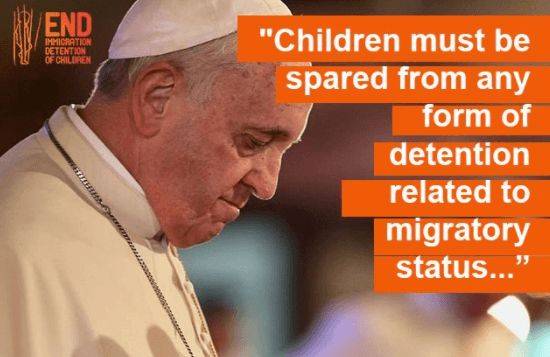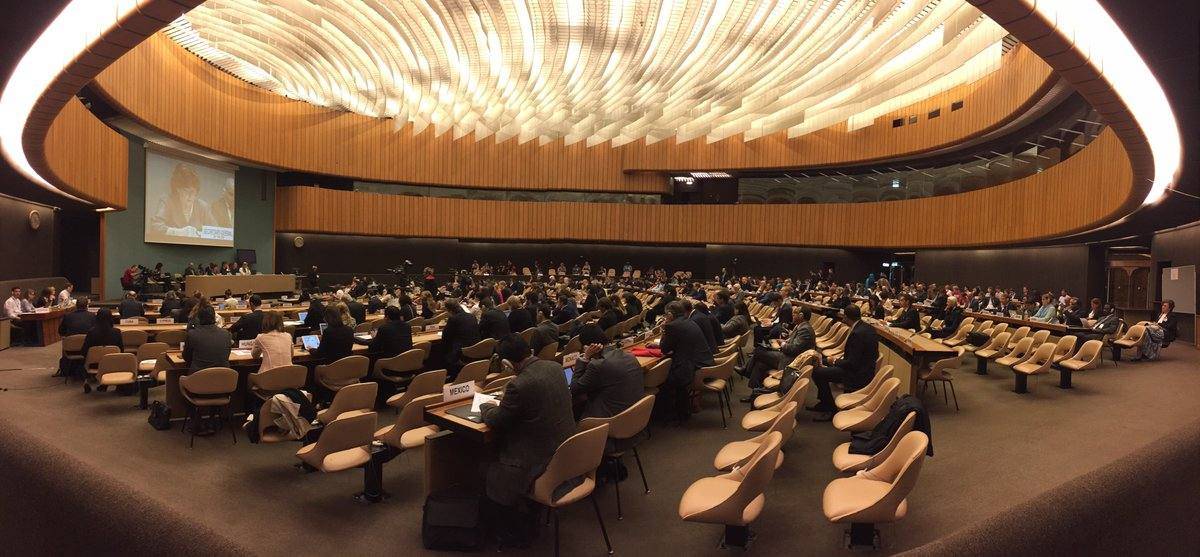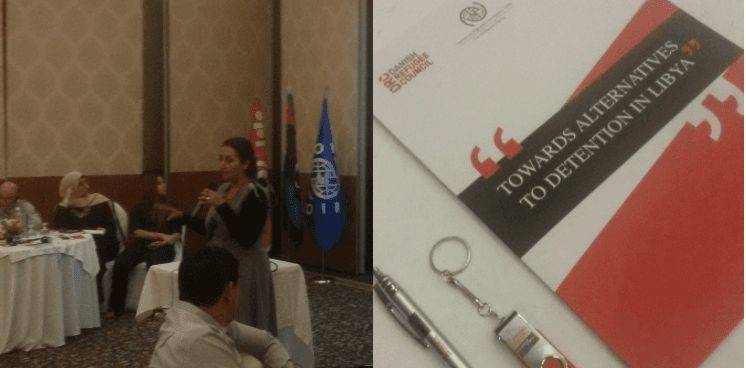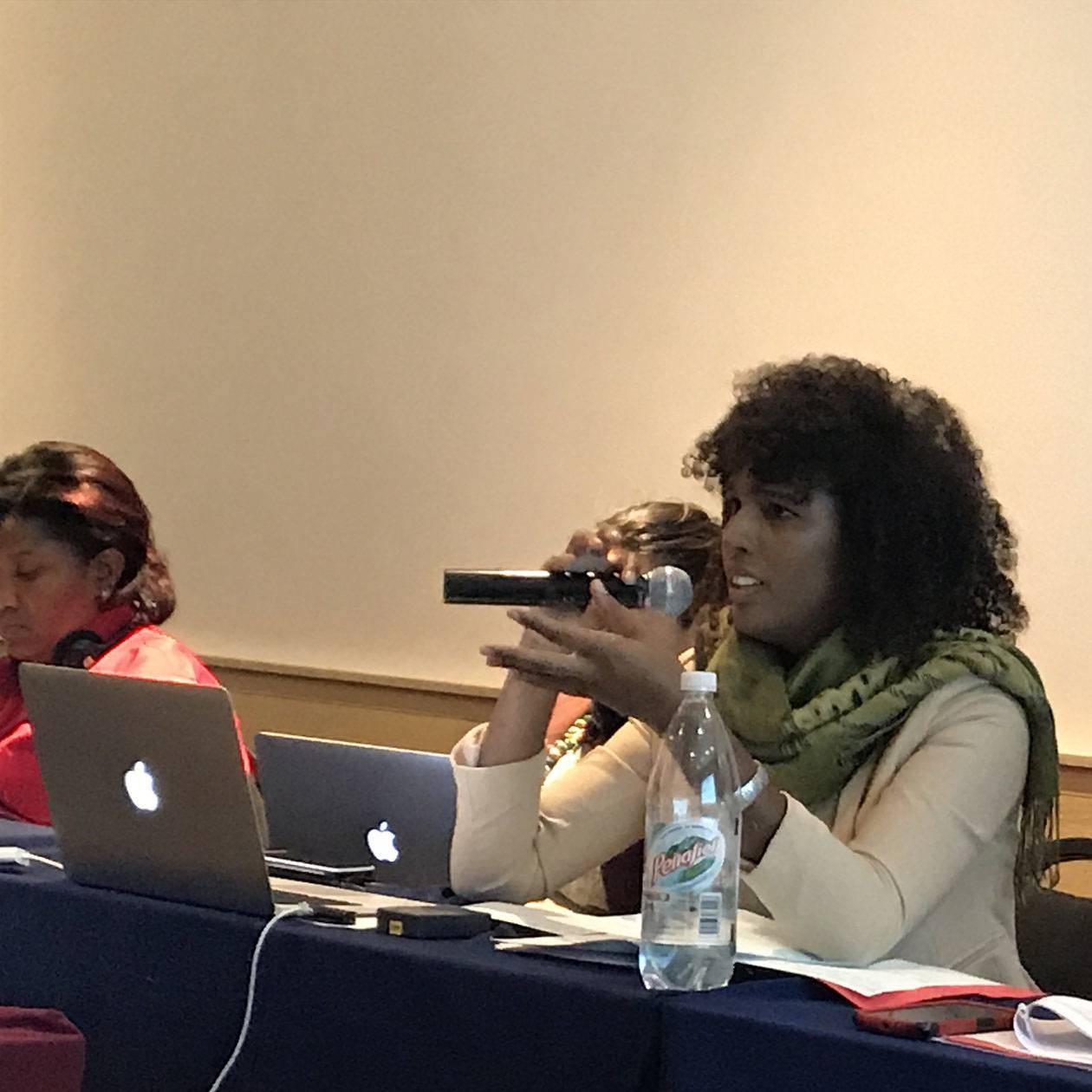Letter from IDC Director: Leadership Change Announcement
"After 10 wonderful years developing and running the IDC, I have made the big decision of moving on to new horizons."
Grant Mitchell, Director of IDC
Dear IDC Members and Partners,
I hope you had a well deserved restful holiday period and are ready for the year ahead.
Following a challenging yet impactful 2017, the IDC has a big year before us.
We will continue our global work to end the immigration detention of children and to expand use of alternatives to detention, including an increasing number of pilots being developed with local members around the world.
We will undertake a review of our work to date, including an external evaluation, and will be developing our next three-year Strategic Plan.
In 2018, the IDC will also be working to roll out of a range of new global tools, including the:
- New online tool to search for examples of alternatives to detention, similar to the ATD global map
- Online Training Toolkit
- Vulnerability Screening Tool
- Global Scorecard on ending immigration detention of children.
We are very excited about these tools and the continued work together with partners and members on the ground to see a world in which no one is subjected to immigration detention.
In addition, I have some news to share that after 10 wonderful years developing and running the IDC, I have made the big decision of moving on to new horizons in March.

This year, 2018, is the 25th year I have worked on asylum and detention issues, since 1993. It’s a great time for me to reflect on this wonderful work and I am excited to move to the next phase of my life.
I love the IDC and am thrilled to see how it has grown and strengthened, and the opportunities that lie ahead.
I had a strong vision for the IDC in 2008: that case management was a way forward to show governments there was no need to use damaging detention; that there were alternatives that work; and that the skills and expertise of our members could be harnessed for global change for people affected by immigration detention.
I have been excited and humbled to see on an almost daily basis that vision make a global impact. The work of the team and our members and their passion and dedication make me feel both proud and thankful.
I am excited that the IDC will be moving forward with a new leadership and developing its next 3-year strategic plan.
The IDC is a robust, responsive, reputable and resilient organisation, with an exciting future and an opportunity to explore further its global impact, building on the foundation of the past few years. Funding has been secured for the period ahead, and with a range of funding opportunities to enable it to both sustain and grow.
The Board have cemented a succession plan and next steps, with the position to be advertised this week and posted on our website www.idcoalition.org, with the aim to undertake interviews in early February.
A large part of the role has been instilling a trust and belief in our vision and model for change, from members to funders to UN and governments. The Board are focused on continuing the strong and clear vision for the IDC and for people affected by immigration detention with its strategic, practical and solutions-based way of working.
"I will continue to support the IDC and will remain of service in an individual capacity to support the work on alternatives to immigration detention."
As you all know, I feel strongly about the potential of government engagement as an advocacy strategy to impact the practical application of human rights. I will be pursing this in my PhD through a research program scholarship I received based at Swinburne University.
I have also increasingly felt the need to work on the right to life and liberty for LGBTI in countries where arrest and death penalty are prevalent and will be working to develop a new NGO focused on this.
As some countries move increasingly towards advancing the civil, political, economic, social and cultural rights for LGBTI, we are simultaneously seeing the targeting and arrest of lesbian, gay, bisexual, transgender and intersex persons in 76 countries where homosexuality and gender diversity remain criminalized and marginalized. The vision and strategy for this new work really hit me recently, and I am excited to develop it further.
There are too many people to thank for their support over these past years; all of the team, the Board, the inspiring members and funders who believe in us. Thank you.
I have loved working with you all, and learning from and being inspired in so many ways. I know we will continue to keep our contact and connection in the wonderful work you are all doing, and that you will continue to expand into the future.
Warmest,
Grant
ICRC Comment on the Global Compact on Migration

The International Committee of the Red Cross has released a comment on the Global Compacts, and it's got some great content.
Their three key messages:
- Detention for immigration-related reasons should be avoided – liberty should be the norm; if there are
grounds for deprivation of liberty, alternatives to detention should be considered first; - States should commit to ending the detention of children and family separation for immigration-related
reasons – in our experience, the best interests of the child are not served by such detention; - Immigration detention is not only harmful for individuals, it is also costly for societies – it is in theinterest of States to avoid detention and identify non-custodial alternatives.
Authoritative guidance: Immigration detention is a violation of children’s rights
Following a widespread consultation process, the Committee on the Rights of the Child (CRC Committee) and the Committee on the Protection of the Rights of All Migrant Workers and Members of Their Families (CMW Committee) jointly adopted two general comments on the human rights of children in situations of international migration in September 2017:
- On the general principles regarding the human rights of children in the context of international migration[1]
- On State obligations regarding the human rights of children in the context of international migration in countries of origin, transit, destination and return[2]
These Joint General Comments provide authoritative guidance on the interpretation of the provisions of the Convention on the Rights of the Child and, as such, apply to all State Parties of the Convention on the Rights of the Child and /or the International Convention on the Protection of the Rights of All Migrant Workers and Members of Their Families.
The Joint General Comment on State obligations regarding the human rights of children in the context of international migration in countries of origin, transit, destination and return reinforces and further clarifies that immigration detention is a child rights violation. Specifically, it states:
- [B]oth Committees have repeatedly affirmed that children should never be detained for reasons related to their or their parents’ migration status and States should expeditiously and completely cease or eradicate the immigration detention of children. Any kind of child immigration detention should be forbidden by law and such prohibition should be fully implemented in practice.
The Committees clarified the reason the principle of ‘last resort’ does not apply to children in the context of migration, stating:
- Article 37 (b) of the Convention of the Rights of the Child establishes the general principle that a child may be deprived of liberty only as a last resort and for the shortest appropriate period of time. However, offences concerning irregular entry or stay cannot under any circumstances have consequences similar to those derived from the commission of a crime. Therefore, the possibility of detaining children as a measure of last resort, which may apply in other contexts such as juvenile criminal justice, is not applicable in immigration proceedings as it would conflict with the principle of the best interests of the child and the right to development.
The Joint General Comment provided further guidance on several points regarding immigration detention including that children should not be criminalized or subject to punitive measures due to their migration status (paragraph 7) and that unaccompanied minors should not be detained either for the migration status or on the basis of being unaccompanied or separated (paragraph 8). In addition, the Committees highlighted the harm for children from any deprivation of liberty, even when detained for short periods or with their families (paragraph 9).
All 193 UN Member States committed to work towards ending child immigration detention as part of the New York Declaration in September 2016. This guidance is a timely contribution that will assist in animating States to move beyond a political commitment into action.
More Information
Read the Joint General Comments here and here
The Convention on the Rights of the Child (CRC) can be found here.
The International Convention on the Protection of the Rights of All Migrant Workers and Members of Their Families (CMW) can be found here.
--
[1] Committee on the Rights of the Child, and Committee on the Protection of the Rights of All Migrant Workers and Members of Their Families. 2017. Joint general comment No. 3 (2017) of the Committee on the Protection of the Rights of All Migrant Workers and Members of Their Families and No. 22 (2017) of the Committee on the Rights of the Child on the general principles regarding the human rights of children in the context of international migration. Available online at: http://tbinternet.ohchr.org/_layouts/treatybodyexternal/TBSearch.aspx?Lang=en&TreatyID=7&DocTypeID=11
[2] Committee on the Protection of the Rights of All Migrant Workers and Members of Their Families, and Committee on the Rights of the Child. 2017. Joint general comment No. 4 (2017) of the Committee on the Protection of the Rights of All Migrant Workers and Members of Their Families and No. 23 (2017) of the Committee on the Rights of the Child on State obligations regarding the human rights of children in the context of international migration in countries of origin, transit, destination and return. Available online at: http://tbinternet.ohchr.org/_layouts/treatybodyexternal/TBSearch.aspx?Lang=en&TreatyID=7&DocTypeID=11
Resources to Advocate for Alternatives to Detention in the Global Compacts
On the 19th of September last year (2016), Heads of State and Government at the United Nations General Assembly adopted the first ever UN declaration on migration - the New York Declaration for Refugees and Migrants. This complements Target 10.7 of the Agenda 2030 Sustainable Development Goals, which calls for Member States to facilitate responsible migration and mobility of people; "...including through implementation of planned and well-managed migration policies."
- The Children's Rights in the Global Compacts Recommendations, were put together by a consortium of Global Child Rights Expert NGOs. Section Five in this document focuses on ending the immigration detention of children and ensuring alternatives to immigration detention of children. It outlines the issue, the connected international legal framework, the New York Declaration commitment, examples and then a set of goals, targets and indicators.
- The second is the Global Migration Group's draft 'Principles and Guidelines, supported by practical guidance, on the human rights protection of migrants in vulnerable situations within large and/or mixed movements'. This comprehensive guidance was specifically referred to in the New York Declaration itself: “We take note of the work of the Global Migration Group to develop principles and practical guidance on the protection of the human rights of migrants in vulnerable situations.” (New York Declaration for Refugees and Migrants, para. 51)". It is to be hoped that the human rights outlined in this document will be upheld in the final Compacts once all consultations are concluded in July 2018.
Interactive Dialogue
The Office of the Special Representative for International Migration will be holding an interactive dialogue with the SRSG Ms. Louise Arbour, who will give an overview of the state of play on the Global Compact for Migration, with a specific focus on the Secretary-General’s report. This meeting will take place as follows:
Date: Tuesday, 14 November 2017
Time: 10:00AM - 11:30AM (New York time)
Venue: Church Center for the UN (CCUN) in New York, 777 United Nations Plaza, NY 10017 (room to be confirmed).
Please confirm your attendance to Colin Rajah.
For those not able to attend in person, you may watch the dialogue from your computer, tablet or smartphone.
Click to: https://global.gotomeeting.com/join/621573717.
Or, you can also listen to the dialogue by dialing in using your phone: +1 872-240-3311 (U.S.), Access Code: 621-573-717.
Please note that you will not be able to interact during the livecast, but only to watch or listen in.
Interactive Webinar
Following the meeting, an interactive webinar with the SRSG, Ms. Louise Arbour, will be held as follows:
Date: Wednesday, 15 November 2017
Time: 10:00AM - 11:00AM (New York time) (see your respective time zones here.)
To join the webinar, go to: https://bluejeans.com/347796322
Or dial in to:
- +1.408.740.7256 (United States), or
- +1.888.240.2560 (US Toll Free), or
- +1.408.317.9253 (alternate number)
- Other Global Numbers: https://www.bluejeans.com/numbers
- Enter Meeting ID: 347-796-322
- Press #
Alternatives to Detention and Ending Child Detention Highlighted at ExCom
The UN Office of the High Commissioner on Refugees (UNHCR) governing Executive Committee (ExCom) meets in Geneva annually to review and approve the agency’s programmes and budget, advise on international protection and discuss a range of other issues with UNHCR and intergovernmental and non-governmental partners.
The 68th session of the Executive Committee of the High Commissioner’s Programme took place 2-6 October 2017. The profoundly negative impacts of detention were highlighted alongside a strong push for alternatives to detention to be developed. The progress being made by UNHCR on its Beyond Detention strategy was highlighted, as well as developments on the Children on the Move High Commissioners Dialogue, held in late 2016.
“We know alternatives are possible, practical and cost-effective” said Volker Türk, the UNHCR Assistant High Commissioner for Protection.
He also highlighted that some countries have ended child immigration detention, and articulated that this is a realistic goal to aim for, “we can put an end to the immigration detention of children.”
The UN Office of the High Commissioner of Human Rights reiterated this sentiment, with Ben Lewis, Human Rights Officer on Migration and Human Rights calling for rights-based alternatives to detention including alternatives to detention for children.

More information
- Shared Solutions: UNHCR’s ExCom 2017 Keynote Video
- Opening statement by the United Nations High Commissioner for Refugees, Mr. Filippo Grandi
- Statement by the President of the World Bank, Mr. Jim Yong Kim
- General debate: first part; second part; third part; fourth part; fifth part, sixth part
- Statement by the Assistant High Commissioner for Protection, Mr. Volker Türk
Partners in Libya Advocate for Alternatives to Detention

The International Detention Coalition in partnership with IOM, the UN Migration Agency, and the Danish Refugee Council held a two-day meeting to explore alternatives to migrant detention in Libya on October 1 – 2.
The meeting, held in Tunis, brought together representatives from Libya’s Ministries of Foreign Affairs, Social Affairs and Labour plus the Directorate for Combatting Illegal Migration (DCIM) within the Ministry of Interior. Also in attendance were representatives from the African Union, diplomatic staff from eight African countries, Bangladeshi and Pakistani embassy representatives and participants from international NGOs and UN agencies.
The meeting provided an opportunity to discuss alternatives to detention with Embassy representatives, as well as how to address challenges facing diplomatic staff with regards consular procedure for migrants in detention.
Embassy representatives prepared a statement of principles, which was presented to the Libyan authorities on the second day of the workshop. The embassies emphasized the constraints they face in accessing their nationals in detention and called for improved collaboration with Libyan authorities and international organizations to find alternatives to detention that comply with Libyan law.
While the situation in Libya is complex and migration has many drivers that require efforts in the countries of origin, transit and destination, there are immediate practical steps that can be taken, emphasized Junita Calder, the International Detention Coalition representative.
These include introducing screening mechanisms, ensuring referrals and adopting a case management approach. With embassies on board to assist in this effort, there is an even greater likelihood of success, said James Martin, Head of Programmes, Danish Refugee Council.
Karolina Edsbacker, IOM Libya Protection Officer, praised ongoing ad-hoc initiatives of the diplomatic community in Libya to find alternatives to detention. “Community housing and other safe alternatives need to be further developed outside of detention and, for this, the collaboration with the embassies is key,” she explained.
This article is an excerpt from an IOM Press Release.
Please visit the link for full details.
Pope Francis Global Compact Plan Calls To End Child Detention
The Vatican's migrants and refugee section has published a comprehensive, 20-point action plan for governments as the two Global Compacts on Refugees and Safe and Orderly Migration develop.
The documents advocate for effective and proven measures which constitute an integral response to the refugee crisis, grouped into actions: to welcome, to protect, to promote, and to integrate.
Section 3b calls encourages States to "adopt national policies which prefer alternatives to the detention of those seeking access to the territory" and further states" .
It specifically highlights States obligations under the Convention of the Rights of the Child (CRC) to adopt alternatives to mandatory detention, which is never in the best interest of the child, no matter their migratory status.
The Vatican's Migrants & Refugees Section is a small action-oriented Vatican office personally directed by Pope Francis helping the Church worldwide to support those who are forcibly displaced by conflict, natural disaster, persecution or extreme poverty; those who are making their difficult way to safety or are stuck; and those who fall victim to human trafficking.
The action plan compliments a speech made by the Pope on August 17 in preparation for Catholic World Migrant Day (January 18) highlights the the lamentable situation of many migrants and refugees fleeing from war, persecution, natural disasters and poverty. In this speech he states "the International Convention on the Rights of the Child provides a universal legal basis for the protection of underage migrants. They must be spared any form of detention related to migratory status, and must be guaranteed regular access to primary and secondary education."

Making Alternatives Work: Global Implementers Workshop

International Implementers of Alternatives to Detention Meeting, August 2017, Mexico City
Practitioners from around the world attended a 2-day workshop in Mexico City to share insights into successful implementation of alternatives to detention.
20 civil society actors and partners actively developing and implementing alternatives attended the workshop, including:
FM4 Paso Libre (Mexico)
Institute for Women in Migration (IMUMI) (Mexico)
La 72 Hogar Refugio para Personas Migrantes (Mexico)
Living Water Community (Trinidad and Tobago)
Sin Fronteras (Mexico)
During the workshop, participants discussed screening and referral processes, case management and the importance of building engagement rather than having an enforcement approach.
There is a growing interest from both government and civil society stakeholders in exploring more reliable, cost-effective alternatives to detention in order to address the human rights and humanitarian concerns and resource constraints associated with detention.




This workshop provided an opportunity to explore how alternatives operate in a variety of local contexts and translate international human rights standards to concrete implementation.
A report will be available shortly detailing insights from the workshop.
If you would like to know more about alternatives to detention, use our free online learning course available here.

IDC Member Meeting 2017

IDC Member Meeting 2017, International Conference Centre in Geneva, June 16 from 4.30 – 6.30 pm
Over 100 Members attended the IDC Member Meeting for 2017, held in Geneva alongside the annual UNHCR Consultations with NGOs.
The meeting was broadcast for our members who were unable to attend in person, and provided a quick overview of key achievements in the previous year, and time for dedicated discussion and feedback around the core areas of work that the network will undertake in the next year.
We also launched the IDC Online Training Toolkit, which enables our members and partners to learn from experts on making alternatives to immigration detention work. Courses are available in short 15 minute lessons that can be taken online, anywhere, anytime.
IDC Toolkit Launch: Members from Int. Detention Coalition – IDC on Vimeo.
Before the member meeting we conducted a short survey of our membership. The key findings of this survey are summarised below, and if you are interested in finding out more, you can request a copy of the minutes of the meeting by emailing [email protected].
“Roundtable held, IDC screening tool introduced, re-engagement on ATD sought… led to 7 ATD releases so far in 2017” IDC Member in Canada



Breakout groups at the IDC Member Meeting
Key issues our members faced in 2016:
- Very conservative governments worldwide, with more detention policies
- Lack of access & services in detention (although services
- Child detention continues worldwide
- Transnational relationships continue to impact on State detention policies
- Human Rights Commissions continue to play a key role in advocacy
Key Priorities for our members in 2017:
- Advancing pilots on alternatives
- Doing training on alternatives – especially case management
- Campaigning to end child detention
- Support NGOs to strategise and present a clear and coordinated framework
“Advancing pilots on alternatives – keep the momentum going!” IDC Member in Libya
Resources
Find the agenda for the meeting here.
Access the power point for the member meeting here.
You can watch the broadcast of the meeting here.
For a copy of the minutes of the meeting please email [email protected]
IDC Presents at First Thematic Consultation for the Global Compact on Migration

On 8-9 May 2017 in Geneva, Switzerland, the United Nations held the first thematic consultation for the Global Compact on Migration on “Human rights of all migrants, social inclusion, cohesion and all forms of discrimination, including racism, xenophobia and intolerance”.
More information and background documents for this event are available here.
During the opening panel on “Human rights of all migrants”, IDC Advocacy Coordinator Ben Lewis stressed the importance of States to honor their long-standing commitment to human rights, noting with concern that:
“In the current political climate, many States seem more concerned with stopping or limiting irregular migration than protecting the fundamental rights of people on the move.”
Among other things, Mr. Lewis highlighted the fundamental right to liberty of all persons, regardless of legal or migration status, and called upon States to end the criminalization of irregular migration, to adopt rights-respecting alternatives to immigration detention, and to refrain from the immigration detention of migrants in situations of particular vulnerability, including children and families.
“Migrants in situations of particular vulnerability should never be detained in the context of routine border governance. And regarding children and families in particular, it is now incredibly clear that the detention of children based on their or their parents’ migration status is never in the best interests of the child. . .”
You can read the complete remarks of Mr. Lewis online here.
Background documents
- Invitation to the session and the informal stakeholder dialogue
- Procedural note (including agenda)
- Organizational arrangements
- Issues brief
- Organization of work:
- Report of the session:






